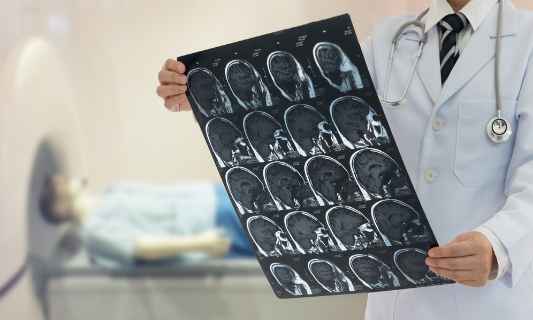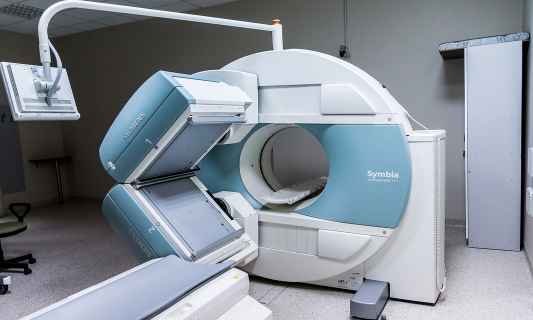Radiologist
Who Is A Radiologist?
A radiologist is a medical doctor who specialises in the investigation and diagnosis of a range of medical disorders and diseases using various imaging techniques. As a radiologist, you will be using imaging to aid diagnosis and provide guidance, opinion and advice. As a radiologist, you will be an expert in procedures like computed tomography (CT) scans, fluoroscopy, magnetic resonance imaging (MRI), ultrasound and X-rays.
Roles & Responsibilities
Evaluating medical records. Before performing a diagnostic procedure you will assess your patient’s medical history and ailment. There may be circumstances when you would suggest alternative diagnostic techniques.
Performing diagnostics. You will perform various diagnostic imaging procedures or direct radiology staff to perform the same. For example, your daily work would include performing X-rays, MRIs, CT scans and ultrasounds, in order to diagnose illnesses and injuries. Diagnostics could be done to perform to find out bone fractures, unwanted internal growths etc.
Interpreting test results. After performing the diagnostic tests, you will use your training and expertise to make a diagnosis based on the results and form an opinion. Be it cardiovascular issues or malignancies, you could be using radiological imaging to diagnose anything.
Consulting with colleagues. As a radiologist, you will be communicating the test results and your opinion to the patient’s primary physician, generally in the form of a written report. This is an important part of a radiologist’s job as in many cases sensitive opinions and medical decisions are made based on this communication.
Managing radiation exposure. Radiology techniques can lead to a certain amount of radiation exposure unless adequate safety measures are taken. As a radiologist, you must be careful. You must ensure the safety of your patients as well as your team. As a part of your managerial duty, you have to ensure that signage and safety instructions are in place outside MRI or X-ray areas so the patients and your staff are aware of the exposure risk.
Writing reports and presentations. You will write reports based on the diagnostic tests conducted and hand it over to the patient or the concerned physician. In high profile cases, you may have to constantly update the interdepartmental team on the findings of the tests and come up with regular reports for their information and documentation.
Take the Mentoria career assessment, to find out how well-suited you are as a Radiologist.
Discover your Ideal future
Get expert guidance and mentorship towards your perfect fit.
What Skills Will I Need To Have To Do This Job Well?
As exciting as this sounds, there are some things you’ll need to learn to do the job right:
SCIENCE AND MATH EXPERTISE
As a radiologist, you should be able to use scientific methods to solve and interpret a test result. You must be an expert at choosing a mathematical method or formula for the same. For example, you should have the scientific expertise to identify the importance of a particular growth in the patient’s body.
MANAGEMENT SKILLS
As a radiologist, you must ensure the effective utilisation of your resources and manpower. You should be able to motivate, develop, and supervise your staff. You will have to ensure that your staff is up-to-date in terms of technology.
TEAM PLAYER
You will be working in a team and displaying team spirit will be critical. You should be able to work in close coordination with your colleagues. As a part of this, you will be expected to consistently exchange knowledge with your team members, both learn from and teach them, and encourage them to take more responsibility when the situation demands.
TECHNOLOGICAL EXPERTISE
As a radiologist, you should be comfortable with the equipment and machinery that are used in the clinic. You should be familiar with the gauges, dials, readings and calibrations to make sure a machine is working properly.
COMMUNICATION SKILLS
Your patients will look up to you for your expert opinion and technical insight. Besides, part of your responsibility will also be to provide written reports of the diagnostic tests. Therefore strong written as well as spoken communication skills are essential for a radiologist. You will also read and understand work-related materials and may write academic or research documents, all of which demands strong communication skills as well.
PROBLEM-SOLVING SKILLS
You should be able to combine several pieces of information and draw conclusions when it comes to interpreting test results. This will enable you to notice a problem in the process, often before there actually is one. As a radiologist, you should be able to analyse and recognise the nature of a disorder and form an opinion based on such analysis. This skill will enable you to make sense of information that sometimes might seem without meaning or pattern.
What Will My Workplace Look Like?
Radiologists mostly find employment in various medical institutions such as clinics, hospitals, government institutes etc. Due to the high technological requirements, you are more likely to be associated with a well-equipped radiology department rather than be in private practice.
Radiology department in hospitals may remain open 24 hours due to sudden requirements of its facilities. However, you will have fewer emergencies compared to many other medical specialities. You will have advanced research opportunities as well as the opportunity to work with the latest
What Is My Scope For Career Growth As A Radiologist?
Radiologists mostly find employment in various medical institutions such as clinics, hospitals, government institutes etc. Due to the high technological requirements, you are more likely to be associated with a well-equipped radiology department rather than be in private practice.
Radiology department in hospitals may remain open 24 hours due to sudden requirements of its facilities. However, you will have fewer emergencies compared to many other medical specialities. You will have advanced research opportunities as well as the opportunity to work with the latest technology.
How Much Will I Get Paid?
The exact number will depend on the reputation and expertise in the profession, but we can give you a general idea.
Radiologists earn between INR 610,000 – 5,000,000 per annum in India at an average of INR1,910,000. Once you are a senior radiologist, you would assume more managerial responsibilities and this will leverage your earnings accordingly.
Okay, I'm sold. This is amazing

STEP 1: Foundation
Your initial journey would be the same as it would be for a regular doctor.

STEP 2: MD/DNB
MBBS doctors can appear for Post Graduate Medical Entrance tests to pursue MD or DNB. These courses are generally for three years. Besides, there are diploma courses like Diploma in Medical Radio-Diagnosis (DMRD), which is, however, not eligible for teaching jobs.

STEP 3: DM (Neuro Radiology/ Interventional Radiology/ Vascular Radiology)
After completing MD, radiologists can pursue the 3-year DM course, which gives you the option of further research work and super-specialisation with the exposure of residency.

STEP 4: Land a Job
At this stage, you are a qualified radiologist and you can choose a private practice or employment in a healthcare institute.
Sign Up for Mentoria - India’s Most Reliable Career Discovery Platform
Mentoria promises to handhold you during your career discovery journey - from the time you sign up until you get into a career you love.
Discover your Ideal future
Get expert guidance and mentorship towards your perfect fit.


